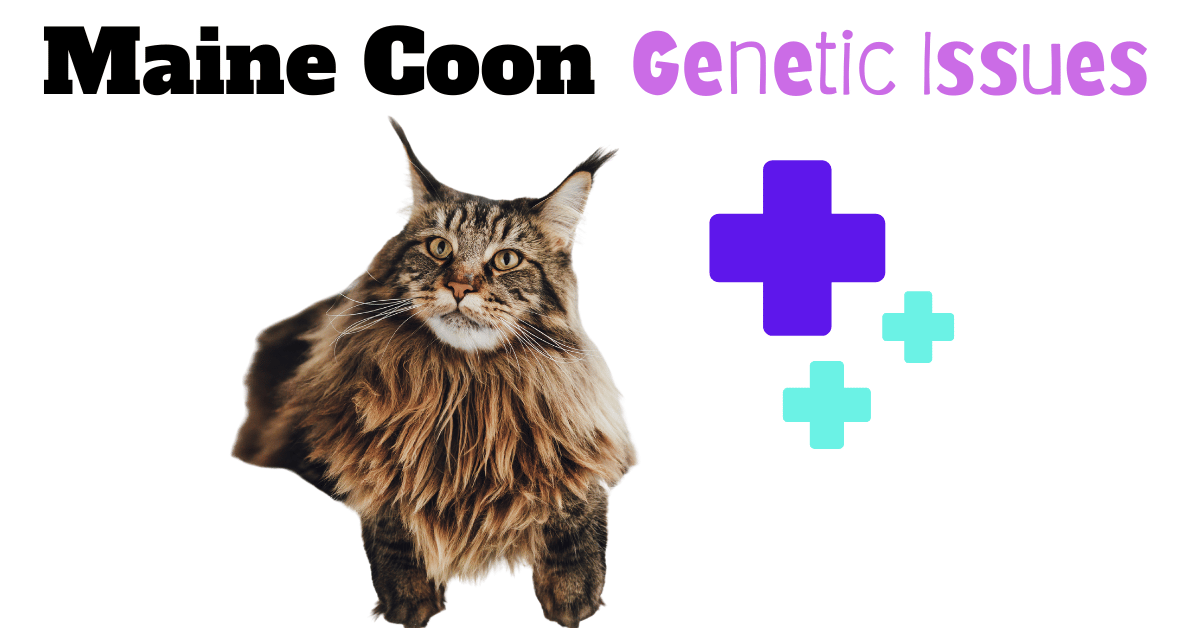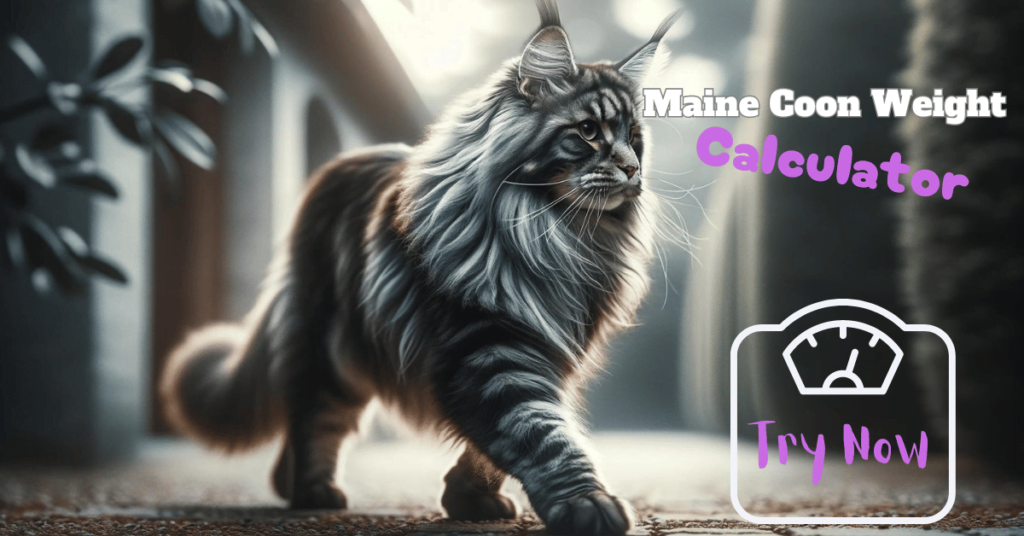This post contains affiliate links and I will be compensated if you make a purchase after clicking on my links.
Understanding Genetic Diseases of Maine Coon Cats: A Health Overview
The Maine Coon stands out not only as one of the largest domesticated cat breeds but also as one of the most cherished by cat enthusiasts worldwide. For owners of these majestic animals, it is essential to understand the various health challenges they may face.
While Maine Coons are susceptible to both hereditary and lifestyle-related health issues, this post will focus specifically on the genetic diseases that are prevalent within the breed.
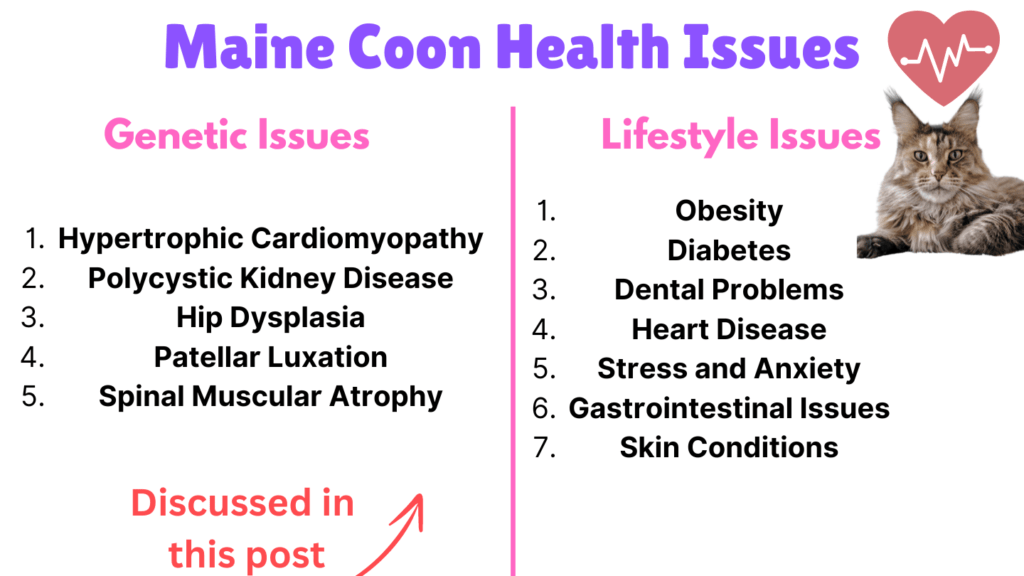
Addressing these issues is vital as they can significantly impact the quality of life and longevity of these gentle giants. With attentive care and early detection, Maine Coons can enjoy a long and healthy life, often living comfortably up to 15 years or more. Indeed, with proper management, some Maine Coons can surpass the age of 20 without frequently suffering from lifestyle-related issues.
Severity and Impact of Genetic Diseases of Maine Coon Cats
| Genetic Condition | Severity Scale (1-5) | Impact on Life Quality |
|---|---|---|
| Hypertrophic Cardiomyopathy (HCM) | 4 | High: Risk of heart failure, affects daily functioning |
| Polycystic Kidney Disease (PKD) and Kidney Cysts | 3 | Moderate to High: Leads to gradual renal failure |
| Hip Dysplasia | 3 | Moderate: Causes chronic pain, reduces mobility |
| Patellar Luxation | 2 | Low to Moderate: Causes intermittent pain and limping |
| Spinal Muscular Atrophy (SMA) | 2 | Low: Affects mobility, not painful |
Key for Severity Scale
- 1 (Lowest): Minimal impact, manageable with little intervention.
- 2: Minor impact, manageable with some intervention.
- 3: Moderate impact, affects daily life, requires regular management.
- 4: High impact, significantly affects life expectancy and quality.
- 5 (Highest): Critical impact, life-threatening even with management.
Hereditary Health Issues in Maine Coons
1. Hypertrophic Cardiomyopathy (HCM)
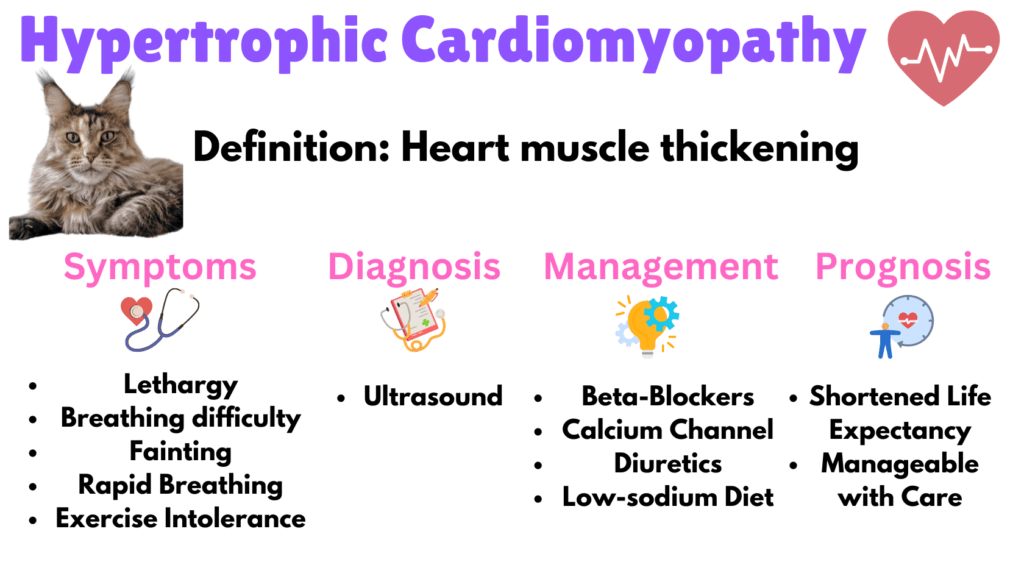
Hypertrophic Cardiomyopathy (HCM) stands as the most prevalent heart disease among Maine Coon – approx. 30%. This condition is marked by the thickening of the heart muscle, which can ultimately hinder the heart’s ability to pump blood efficiently.
Symptoms
Cats with HCM may exhibit various symptoms that range in severity. Early signs often include lethargy and difficulty breathing. As the condition progresses, affected cats might experience occasional fainting spells, rapid breathing, and an intolerance to exercise. The onset of symptoms typically suggests an advanced stage of the disease, making prompt veterinary consultation crucial.
Diagnosis
Diagnosing HCM requires a comprehensive cardiac evaluation, typically performed via echocardiography—a specialized ultrasound of the heart. This diagnostic tool enables veterinarians to measure the thickness of the heart muscle and assess its overall functionality, providing crucial information for accurate diagnosis and effective treatment planning.
It is recommended to conduct this examination annually once your Maine Coon reaches the age of 6-7 years old.
Management
Management of HCM in Maine Coons is multifaceted, often involving medications to improve heart function and manage symptoms. Common pharmacological treatments include beta-blockers or calcium channel blockers to reduce heart muscle contraction and diuretics to ease fluid accumulation. Additonally, a diet aimed at minimizing sodium intake and optimizing nutrition is highly recommended.
Prognosis/Implications
The prognosis for cats with HCM varies. While the disease can significantly shorten a cat’s life expectancy, especially without treatment, early detection and proper management can help maintain a good quality of life. Regular follow-ups with a veterinarian are essential to monitor the condition and make necessary adjustments to the treatment plan, aiming to stabilize the condition and prevent complications like heart failure.
2. Polycystic Kidney Disease (PKD) and Kidney Cysts
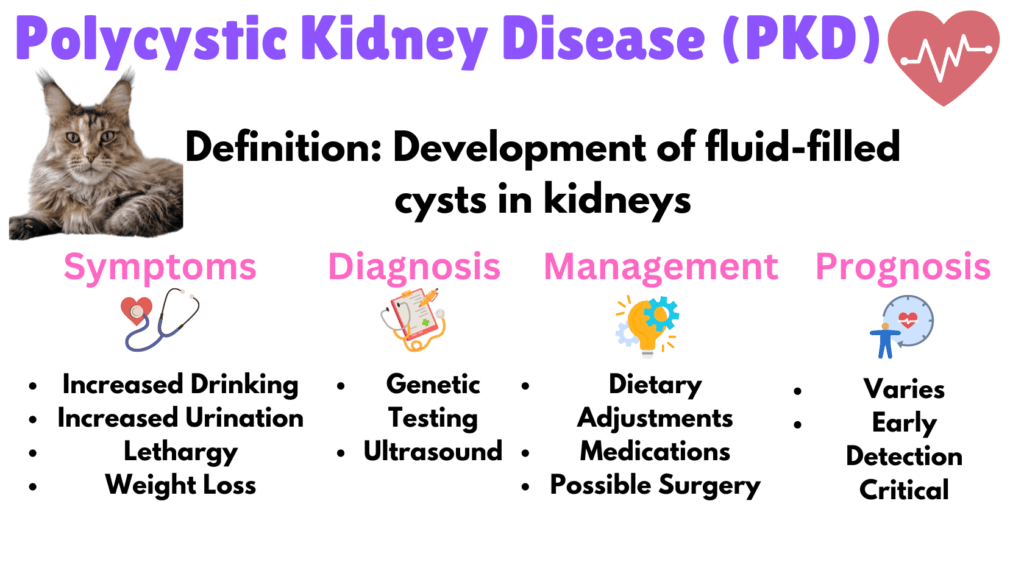
Polycystic Kidney Disease (PKD) and kidney cysts are genetic disorders characterized by the development of fluid-filled cysts in the kidneys. These cysts can expand and multiply over time, impairing kidney function and potentially leading to renal failure.
Symptoms
Initially, cats with PKD or kidney cysts may show no noticeable symptoms, making early detection challenging. As the disease progresses, symptoms such as increased drinking and urination become more evident. Owners may also observe their cats becoming lethargic and experiencing weight loss. These signs suggest deteriorating kidney function and warrant immediate veterinary attention.
Diagnosis
PKD and kidney cysts are primarily detected through genetic testing, which identifies the genetic markers associated with these conditions in Maine Coons. Complementing this, ultrasound imaging is crucial for visualizing the structure of the kidneys, enabling veterinarians to identify and assess the extent of cyst development.
Additionally, routine blood work and urinalysis are important as they can help signal underlying problems with kidney function.
Management
Managing PKD and kidney cysts typically involves a comprehensive approach that includes dietary adjustments and medications designed to support kidney function and slow the disease’s progression.
Recommended treatments often encompass antibiotics, anti-inflammatory medications, pain relief, appetite stimulants, and fluid therapy to address symptoms and improve quality of life.
Nutritionally, it is crucial to adopt a diet that supports kidney health, focusing on high-quality, human-grade canned, raw, or gently cooked foods, rather than low-protein or dry prescription diets.
Prognosis/Implications
The prognosis for cats with PKD or kidney cysts varies depending on the severity of the condition and the effectiveness of the management strategy. Early detection and proactive management are key to prolonging life and maintaining quality of health. With appropriate care, cats with these conditions can live comfortably, although ongoing monitoring is essential to address any progression of the disease.
3. Hip Dysplasia in Maine Coons
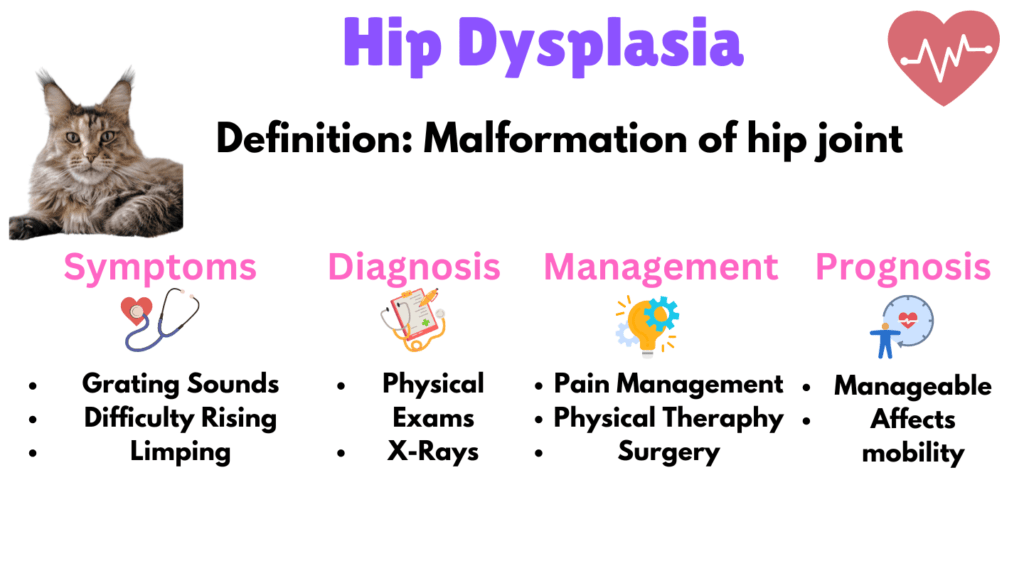
Hip Dysplasia is a structural malformation of the hip joint where the ball of the femur does not fit correctly into the hip socket. This condition, affecting up to 20% of larger breeds including Maine Coons, can lead to arthritis and significant mobility issues over time.
Symptoms
Cats with hip dysplasia often experience grating sounds during movement, reduced thigh muscle mass, and increased shoulder mass as they shift more weight onto their shoulders to avoid hip pain.
They may also have difficulty rising, show reluctance to jump or climb, and display noticeable limping, particularly after periods of rest or extensive activity. These symptoms tend to become more pronounced as the cat ages or as the dysplasia worsens.
Diagnosis
Diagnosis of hip dysplasia is primarily made through physical examinations and confirmed with x-rays. These imaging tests allow veterinarians to assess the alignment of the hip joints and the degree of any associated arthritis, providing a clear picture of the condition’s severity.
Management
Management of hip dysplasia in Maine Coons includes a range of treatments tailored to the severity of the condition, encompassing lifestyle modifications, pain management, and, in more severe cases, surgical interventions like joint replacement.
Newer therapies such as stem cell treatment, platelet-rich plasma, physical therapy, acupuncture, and cold laser therapy are also options. Maintaining a lean weight through diet and regular, gentle exercise is essential, as weight management plays a critical role in reducing discomfort and managing pain.
Prognosis/Implications
While hip dysplasia can significantly impact a Maine Coon’s mobility, with appropriate care, most cats can maintain a good quality of life. Regular veterinary check-ups are essential to monitor the condition and adjust care as needed to manage pain and mobility.
4. Patellar Luxation in Maine Coons
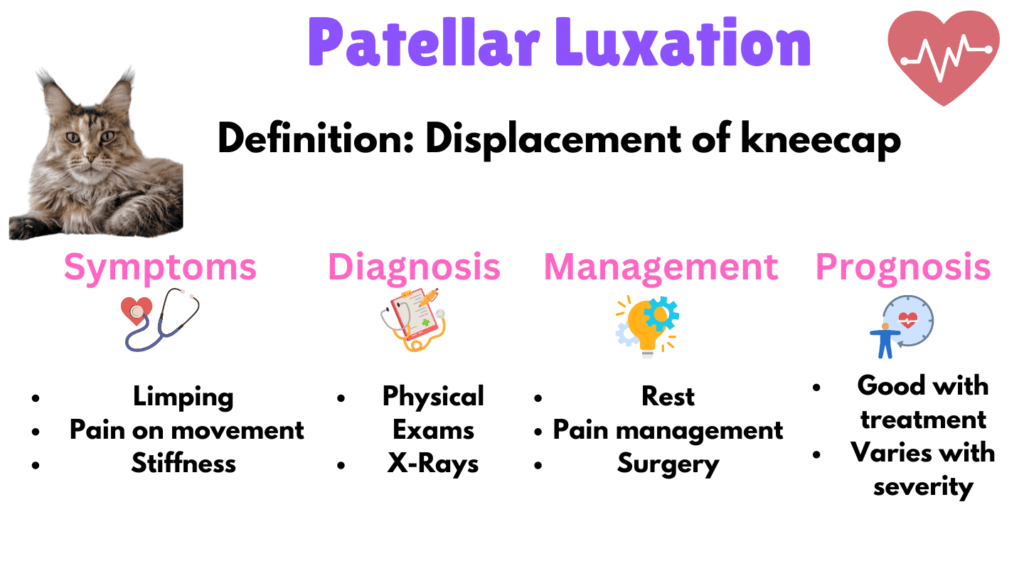
Patellar Luxation is a condition where the kneecap (patella) slips out of its normal position along the groove of the thigh bone (femur), often leading to pain and mobility issues. This condition can vary in severity and may affect one or both knees.
Symptoms
Symptoms include weakness or hobbling of the hind legs, an inability to jump, reluctance to run or exercise, a bow-legged or knock-kneed appearance, and sudden yelps of pain during activity.
Cats often show stiffness or have difficulty rising after resting. Additionally, a primary symptom of patellar luxation is intermittent limping or sudden loss of support on the affected leg, which may occur during activity or after rest. Cats with this condition may also exhibit pain when moving the leg or avoid using the leg altogether, depending on the severity of the luxation.
Diagnosis
Patellar luxation is diagnosed through a thorough physical examination during which the vet may manually palpate the knee to check for the kneecap’s stability and movement. X-rays may also be employed to evaluate the bones’ alignment and to plan for any needed surgical interventions.
Management
Treatment for patellar luxation in cats depends on the condition’s severity. Mild cases, including grade 1 and some grade 2 luxations, can often be managed conservatively with rest and pain management.
More severe cases may require surgical correction, which can include a variety of procedures such as deepening the groove in the femur (sulcoplasty), repositioning the attachment point of the patellar ligament on the tibia (tibial tubercle transposition), releasing tight fascia around the patella, tightening any redundant fascia, and in exceptional cases, corrective femoral or tibial osteotomies.
Prognosis/Implications
Cats with grade I luxating patella may not exhibit signs of pain or lameness and often lead comfortable lives. However, cats with higher grades (III, and IV) of luxating patellas face significant challenges due to anatomical abnormalities. These cats may suffer from pain, stiffness, and complications like arthritis and CCL tears, resulting from the ongoing stress and deterioration of knee ligaments.
5. Spinal Muscular Atrophy (SMA) in Maine Coons
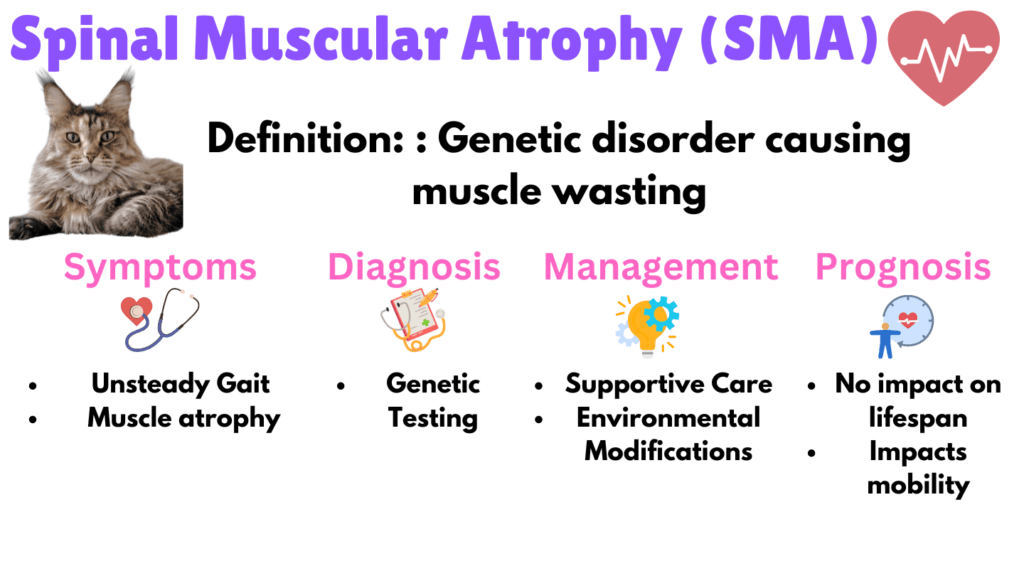
Spinal Muscular Atrophy (SMA) in Maine Coons is a genetic disorder caused by the degeneration of spinal cord neurons, leading to progressive muscle wasting and weakness, primarily affecting mobility but not the cat’s overall lifespan.
The condition, which is not fatal and generally painless, results from a recessive gene; only kittens inheriting the gene from both parents exhibit symptoms. Kittens receiving the gene from just one parent do not develop SMA.
Symptoms
The primary symptoms of SMA in Maine Coons include an unsteady gait and a decreased ability to jump or climb, which may become apparent in kittenhood or early adulthood. Muscle atrophy, particularly in the hind limbs, becomes more evident as the condition progresses. Despite these mobility issues, SMA is not associated with pain.
Diagnosis
Symptoms of Spinal Muscular Atrophy (SMA) in affected cats, including fine muscle tremors, fasciculations, and progressive muscular weakness, typically become evident around 3-4 months of age.
These cats may also display an unsteady gait and muscle atrophy, particularly in the hind limbs. SMA is diagnosed through genetic testing, which identifies the specific gene mutation responsible for this condition. This test is vital for breeders and owners to confirm the diagnosis, enabling early and effective management and care planning.
Management
Management of Spinal Muscular Atrophy (SMA) in cats is centered on supportive care to enhance their quality of life and mobility.
Environmental modifications, such as installing steps or ramps, can provide convenient access to their favorite spots, helping them maintain their independence. Physical therapy is frequently recommended to sustain muscle tone and mobility. However, it’s crucial to understand that there’s currently no known method to halt the progression of SMA.
Prognosis/Implications
While SMA does not typically affect the lifespan of Maine Coons, it significantly impacts their mobility and general activity levels. The condition is non-painful, and with appropriate care, cats with SMA can lead comfortable lives. Regular veterinary visits are important to monitor the cat’s condition and adapt care strategies as needed to address any changes in mobility or activity.
Genetic Testing for Maine Coons: A Closer Look
Genetic testing in Maine Coons provides essential insights into the genetic predispositions of these cats, allowing owners and breeders to make informed decisions about health care, breeding, and management of potential diseases.
How Genetic Testing Works
Genetic testing is typically conducted using a sample of the cat’s DNA, which is usually collected via a cheek swab or a blood sample. This sample is then analyzed in a laboratory, where scientists look for specific genetic mutations known to be linked to various hereditary diseases found in Maine Coons.
What Genetic Testing Can Detect
Genetic tests for Maine Coons can detect a variety of hereditary conditions, including:
- Hypertrophic Cardiomyopathy (HCM): Tests can identify specific mutations in genes like MyBPC3, which are linked to this common heart disease.
- Polycystic Kidney Disease (PKD): Although more commonly associated with Persian cats, genetic tests can also help identify PKD-related genes in Maine Coons.
- Spinal Muscular Atrophy (SMA): This test identifies mutations that lead to muscle wasting and weakness, helping owners manage the condition more effectively.
Where to Get Tested
Genetic testing services are available through various avenues:
- Veterinary Clinics: Many veterinarians offer genetic testing as part of their services or can refer you to a specialist.
- Specialized Genetic Testing Companies: Companies such as Wisdom Panel offer breed-specific genetic testing kits that can be ordered online and completed at home.
- Research Institutions and Universities: Some academic institutions conduct genetic testing and research, often at a lower cost in exchange for contributing to scientific studies.
Securing the Future of Your Maine Coon
Understanding the genetic diseases of Maine Coon cats is crucial for any owner who cherishes their feline companion. By educating yourself about these conditions, you can take proactive steps to ensure the health and longevity of your Maine Coon.
Genetic testing plays a pivotal role in this process, offering a window into the potential health challenges your pet may face. Armed with this knowledge, you can work closely with your veterinarian to manage and possibly prevent some of the most common genetic disorders that affect this magnificent breed.
Meet Sean, a fintech whiz with a penchant for pet purrs and blockchain buzz. After a decade of fintech feats, Sean's tech talents leaped from ledger lines to litter lines, driven by a passion for pets and a vision for a more connected pet care community. With three critter companions as co-pilots, Sean launched this blog to share a treasury of pet-friendly tech tips and tales.

